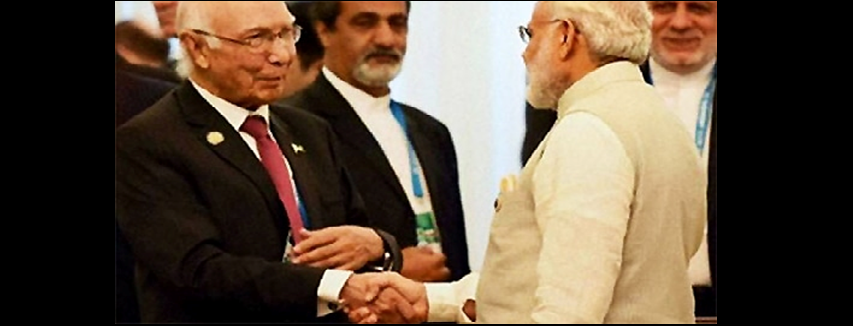HoA Conference Deepens India-Pakistan Divide
NEW DELHI: The Heart of Asia conference in Amritsar concluded with a first of sorts -- namely, the explicit inclusion of the Lashkar-e-Taiba and Jaish-e-Mohammad as destabilising forces in the region.
"We remain concerned by the gravity of the security situation in Afghanistan in particular and the region and the high level of violence caused by the Taliban, terrorist groups including ISIL Daesh and its affiliates, the Haqqani network, Al Qaida, Islamic Movement of Uzbekistan, East Turkistan Islamic Movement, Lashkar-e-Taiba, Jaish-e-Mohammad, TTP, Jamaat-ul-Ahrar, Jundullah and other foreign terrorist fighters," the declaration said. "Acknowledging the support that terrorism derives in our region, we demand an immediate end to all forms of terrorism, as well as all support to it, including financing of terrorism. We recognize that terrorism is the biggest threat to peace, stability and cooperation in our region," it added.
Advisor to the Pakistani Prime Minister on foreign affairs, Sartaj Aziz, who was attending the conference, quickly moved to downplay the significance of mention of the LeT and JeM. Aziz said that the declaration was unanimous, and added that the LeT and JeM were not the only groups mentioned. Aziz also defended Pakistan’s decision to attend the conference, saying, "it was good decision to attend HoA. It was good to attend multilateral forum...to show solidarity with Afghanistan. If we had boycotted, then India would say that first they expelled Pakistan from SAARC and now from HoA.”
Interestingly, Pakistani media too highlighted the pressure the country faced at the conference, with Dawn News saying that “Afghan President Ashraf Ghani and Indian Prime Minister Narendra Modi joined hands to lash out at Pakistan on terrorism as the subject took centre stage at the inauguration of the sixth Heart of Asia ministerial conference.”
In a direct dig at Pakistan, Ghani said that "Afghanistan suffered the highest number of casualties last year. This is unacceptable... Some still provide sanctuary for terrorists. As a Taliban figure said recently, if they had no sanctuary in Pakistan, they wouldn't last a month.” "I don't want a blame game, I want clarifications on what is being done to prevent the export of terror," Ghani added.
Indian Prime Minister Narendra Modi was less direct. Although he didn’t directly name Pakistan, PM Modi called terror “the biggest threat to Afghanistan's peace and the region.” "We must counter terrorists and their masters. We must demonstrate strong collective will to defeat terror network that cause bloodshed and spread fear." "Silence and inaction on terror in Afghanistan and the region will only embolden terrorists and masters and those fund them," he said.
Aziz, on his part, slammed Ghani’s remarks as “baseless accusations.” "It is simplistic to blame only one country for the recent upsurge in violence. We need to have an objective and holistic view," he said. "Peaceful resolution to all the longstanding issues is the only way forward for regional cooperation and connectivity," "Pakistan is ready to extend every kind of cooperation for lasting peace in Afghanistan," he said as reported by Dawn, adding that Afghanistan should avoid levelling false and baseless accusations at Pakistan.
The pressure on Pakistan at the HoA conference comes in context of deteriorating relations between Islamabad and New Delhi/Kabul. India-Pakistan ties have dipped to a historic low ever since the attack on an Indian Army post in Uri killed 18 soldiers in September. India responded with a “surgical strike” across the Line of Control, targeting Pakistani terror camps along the border. In fact, just days before the HoA conference, tensions between the two countries spiralled as a group of armed militants attacked an Indian army unit in Nagrota, Jammu and Kashmir, killing seven soldiers.
Meanwhile, tensions between Islamabad and Kabul continue to simmer, with the latter blaming Pakistan for aiding and abetting terror across the border. President Ashraf Ghani had initially reached out to Pakistan when assuming office, signalling a change in Afghanistan’s Pakistan strategy. The initial outreach seemed to be paying off, with Pakistan using its influence over the Taliban to get the militant group to agree to talks with the Afghan government. However, after a series of failed starts and stops, the talks collapsed, and violence in Afghanistan saw a huge upsurge. Critics of Ghani’s Pakistan policy grew more and more vocal, and soon, Ghani too began to publicly slam Pakistan.
Given the above, the HoA was closely followed by regional and international media. A photo-op of Aziz shaking hands with PM Modi was widely circulated, with drawing rooms circles abuzz with the possibility of India-Pak talks on the sidelines of the HoA summit. Indian Ministry of External Affairs Spokesman Vikas Swarup, however, quickly rubbished the rumours, saying that "a climate of continued terrorism" was the reason talks will not take place.





